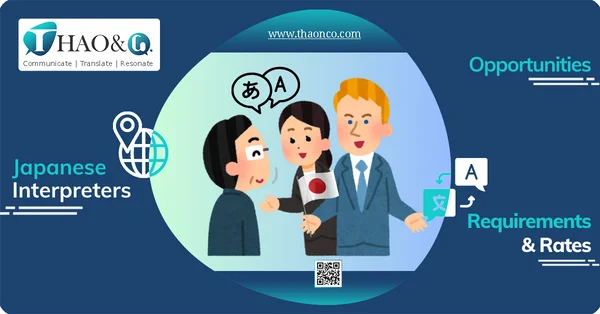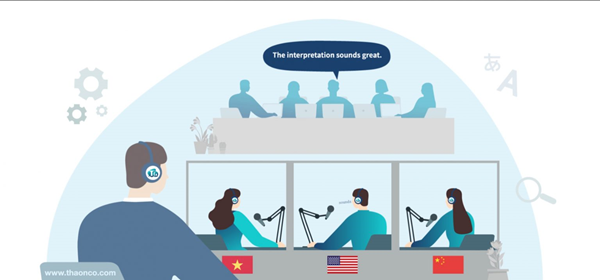The role of a Japanese interpreter is filled with opportunities, presenting a lucrative career trajectory. Nonetheless, it requires a specialized skill set. This can create significant entry barriers.
In this article, Thao & Co explains:
- • Japanese interpreter career prospects
- • Job description
- • Professional qualifications
- • Full-time salary and freelance commission rate
- • Where to find Japanese interpreting jobs and collaborators
What are Japanese interpreters?
Interpreters convey messages from Japanese into other languages and vice versa. With their understanding of language and culture, professional Japanese interpreters facilitates:
- • International events
- • Meetings
- • Conferences
- • Commercial exchanges
Japanese interpreters bridge cultural gaps, ensuring seamless communication for all involved parties. Thus, Japanese interpreters promote close connection, cooperation and cultural exchange between countries.
Prospects in the Field of Japanese Interpretation
Wondering whether Japanese interpreters are in demand? Good news! Japanese linguists are highly sought after in various sectors:
- • Economics and Commerce: Top multinational conglomerates expand their international presence among countries. Thanks to Japanese interpreters, companies and organization can promote their core values while foster cultural exchanges.
- • Tourism and Entertainment: Japanese cultural exports – anime, manga, dramas, music, you name it – all need Japanese translation and interpretation.
- • Sciences and Technology: New discoveries and innovations require professional Japanese translation.
- • Education: Japanese interpreters help educational institutions to branch out into new markets.
Job Profile for Japanese Interpreters
What does a Japanese interpreter do?
- • Before an interpreting session: Research and update their domain knowledge and relevant terminology.
- • During an interpreting session: Listen attentively, process the information, and convey it faithfully in the target language.
Specific modes of interpreting have different requirements:
How to become a Japanese interpreter?
To become a Japanese interpreter, you can take the following approach:
- • University degrees
- • Training courses
- • Self-study
There are specific criteria to excel as a professional interpreter, such as:
Qualifications
A strong command of the Japanese language is non-negotiable. A professional Japanese interpreter should have:
- • JLPT (Japanese Language Proficiency Test) certification
- • Great proficiency in all 4 language skills
- • Keen language awareness: Expert use of Hiragana, Katakana, and Kanji to native or near-native levels.
- • For court interpreting: Bachelor’s degree in Japanese interpreting
- • For healthcare interpreting: Medical degrees or medical interpreting certificate
Linguistic skills
Mastering Japanese language skills to become a professional interpreter is challenging. Here’s why:
- • Sentence structure: Japanese sentence follows subject-object-verb order (different from English). While interpreting, interpreters need to restructure sentences to make them flow naturally in the target language.
- • Reading and writing systems: Kanji characters can be pronounced in either On’yomi (pronunciation derived from Chinese) or Kun’yomi (Japanese pronunciation of Kanji). The correct choice depends on context.
- • Honorific system: Use of honorifics is diverse, nuanced, and context-dependent.
- • Pronoun system: Some Japanese pronouns lack direct equivalents in English. This needs to be handled with cultural sensitivity.
Other requirements
In addition to language proficiency, to excel at interpreting Japanese, you also need a wide set of skills:
- • Mastery of specialized terminology in fields such as engineering, healthcare, law, marketing, or finance is imperative.
- • Thorough understanding of Japanese customs and cultural nuances is crucial for accurate and effective communication.
- • Independent working, time management, task organization, and project adaptability
- • Good communication, improvisation
- • Good manners and etiquette
Japanese interpreter salary
The salary of a Japanese interpreter varies depending on several factors:
- • Experience
- • Expertise
- • Working location
- • Specialization
Check out the average salary of Japanese interpreters in some countries:
- • United States: $30,000 – $70,000 annually
- • Japan: ¥5,200,000 annually
- • Vietnam: VND 11 million – VND 36 million monthly or VND 200,000 – VND 1.5 million / hour for freelancers
However, the rate can be higher if you are a seasoned interpreter working in highly specialized fields such as engineering, healthcare, or finance.
In addition to the basic salary, Japanese interpreters can receive other allowances and benefits such as insurance, pensions, and bonuses depending on the country or company.
Nonetheless, how much a Japanese interpreter can earn also depends on external factors including time and the labor market.
Where to find competent Japanese interpreters?
Here are some suggestions to help you find a good Japanese interpreter:
- ● Search on reputable job-seeking sites and freelancer platforms including LinkedIn, Glassdoor, and Upwork.
- ● Browse specialized websites on interpreting and languages such as ProZ and TranslatorsCafe. These are the social hubs of professional interpreters and translators. So you can expect to find a proficient Japanese interpreter on them.
- ● Join interpreting and Japanese language forums and online communities.
- ● Take advantage of your network and consult someone with experience in hiring or working in the field of Japanese interpretation.
- ● Contact translation and language service companies directly.
Looking for a Japanese interpretation service that is professional, reliable, and affordable? Look no further than Thao & Co.! Partner with us for:
- Professional workflow
- Language interpretation services in more than 50 languages
- Seasoned linguists with Japanese studies degrees and JLPT level N2 or N1 certificates.
Thao & Co. has a wide network of skilled interpreters to meet your projects’ requirements for a large number of interpreters. We develop a terminology glossary beforehand, ensuring all terminologies are used consistently during interpretation.
With an extensive suite of language solutions, we are ready to undertake any assignment. We offer diverse services, including:
- ● Court interpreting
- ● Medical interpreting
- ● Interview interpreting
- ● Lecture interpreting
- ● Meeting interpreting
- ● And many more!
We especially offer a free quote service, so you can estimate the cost of your Japanese interpretation project before you commit.
Access our Get a Quote page or chat with us in the chat box on the right corner of the screen. We are happy to assist you with your Japanese language projects.


